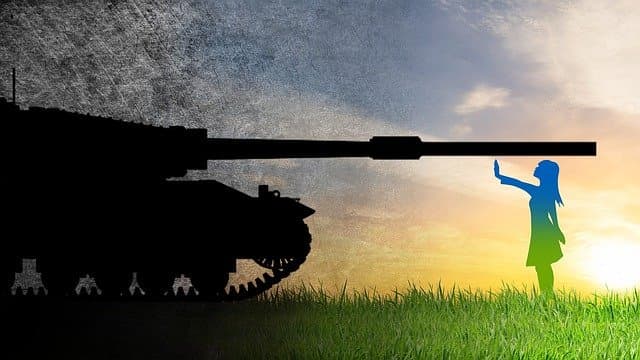 The Bible and War. From Genesis to Revelation, there are several references to God’s favor in warfare. However, the Bible also seems to condemn warfare on several occasions.
The Bible and War. From Genesis to Revelation, there are several references to God’s favor in warfare. However, the Bible also seems to condemn warfare on several occasions.
Because the Bible is easily changed and misunderstood, people seeking to understand the morality of war often struggle with its ambiguous passages and misinterpretations.
It is a complex issue, and many Christians are uncertain about God’s true plan.
Contents
- 1 War is a tragedy
- 2 Conflict Must Be Avoided at All Costs
- 3 The Bible and Pacifism
- 4 What does the Bible say about warfare?
- 5 But didn’t Jesus say, “Blessed are the peacemakers”?
- 6 Jesus Christ and War
- 7 War in the Old Testament
- 8 What does “just war” mean?
- 9 Are preemptive wars permissible?
- 10 War Should Only Be Used as a Last Resort
- 11 God Provides Victory in Righteous Conflicts
- 12 The Christian Perspective on War
- 13 Conclusion
War is a tragedy
War is the greatest tragedy. The Bible portrays war as a terrible waste of human life and a waste of the potential with which God has endowed human beings. War destroys both the world in which people live and the lives of those who are forced to fight.
According to the Bible, taking revenge on another person is not the appropriate response to a situation. Instead, we should give vengeance to God (Romans 12:19).
Sadly, many people put their own selfish agendas ahead of God’s plan. Many people give in to their sinful natures and don’t follow the command to love one another as God loves us (John 13:34).
War is tragically caused by sin, anger, selfishness, and our separation from God’s love.
The greatest expression of God’s love is the gift of life. How can we be considered God’s children if we are willing to murder one another?
If we care about truth and justice, we should trust that God’s unchanging love can turn strangers into friends (Psalm 32:5).
Conflict Must Be Avoided at All Costs
There are over 400 occurrences of the word “war” in the Bible, yet it is difficult to pick a few passages to argue about whether war is good or bad. On the other hand, to fully understand what the Bible says about war, one must study its entire language and historical context.
According to the Bible, sin is a basic human characteristic, and as a result, we are always at war with one another. As long as there is sin in this world, there will be conflict.
Although there have been wars throughout human history and even before (such as the battle between Lucifer and God in heaven; see Revelation 12:7), it is important to remember that war is a result of man’s fallen nature.
Rev.12:7-9 – Then war broke out in heaven; Michael and his angels went forth to battle with the dragon, and the dragon and his angels fought. But they were defeated, and there was no room found for them in heaven any longer. And the huge dragon was cast down and out–that age-old serpent, who is called the Devil and Satan, he who is the seducer (deceiver) of all humanity the world over; he was forced out and down to the earth, and his angels were flung out along with him.

Because God desires peace for His people, the Bible tells us to seek peace wherever possible and to avoid confrontation at all costs (Romans 12:18).
Although many people throughout history have glorified violence, we should strive to be peacemakers rather than warriors, for God did not come to earth with weapons to fight the Roman Empire. Instead, He took human form, died on the cross, and rose again to defeat death and give us eternal life.
The Bible and Pacifism
You may have heard the following argument:
“The Bible does not address conflict. The Bible advocates peace. Jesus advocated pacifism. Christians must be pacifists.”
Regarding the definition,
This argument uses the “either/or” fallacy, often known as the false dilemma fallacy. It assumes that there are only two possible outcomes:
- Or we must admit that no one ever justifies war,
- Maybe we assume that going to war is always a reasonable option.
But there are alternative possibilities. If you feel that the Bible is silent on the subject of war, you might want to take another look. The Bible has a lot to say about “good” and “bad” conflicts, but it’s not always as clear as we’d like.
In the Old Testament, war is typically presented as a necessary evil. One of the primary goals of the invasion of Canaan was to destroy the evil tribes who practiced child sacrifice. The conflict was between right and wrong.
No matter how military or pacifist the Bible’s depictions of battle are, they always reflect God’s purposes and nature. When the Bible uses military imagery to mention spiritual things, as in the book of Revelation, it always shows that good wins over evil and that peace follows.
What does the Bible say about warfare?
The following Bible verses can help us understand the situation better if we keep them in mind.
Some Bible Verses That Reveal God’s Attitude Toward War and Peace
1Pet.2:17 Show respect for all men [treat them honorably]. Love the brotherhood (the Christian fraternity of which Christ is the Head). Reverence God. Honor the emperor.
Rom.13:1-4 LET EVERY person be loyally subject to the governing (civil) authorities. For there is no authority except from God [by His permission, His sanction], and those that exist do so by God’s appointment.
Therefore he who resists and sets himself up against the authorities resists what God has appointed and arranged [in divine order]. And those who resist will bring down judgment upon themselves [receiving the penalty due them].
For civil authorities are not a terror to [people of] good conduct, but to [those of] bad behavior. Would you have no dread of him who is in authority? Then do what is right and you will receive his approval and commendation.
For he is God’s servant for your good. But if you do wrong, [you should dread him and] be afraid, for he does not bear and wear the sword for nothing. He is God’s servant to execute His wrath (punishment, vengeance) on the wrongdoer.
Exodus.23:21-23 Give heed to Him, listen to and obey His voice; be not rebellious before Him or provoke Him, for He will not pardon your transgression; for My Name is in Him.
But if you will indeed listen to and obey His voice and all that I speak, then I will be an enemy to your enemies and an adversary to your adversaries.
When My Angel goes before you and brings you to the Amorites, the Hittites, the Perizzites, the Canaanites, the Hivites, and the Jebusites, and I reject them and blot them out.
The next line indicates that God has a plan when conflict breaks out:
Deut.20:1-20 WHEN YOU go forth to battle against your enemies and see horses and chariots and an army greater than your own, do not be afraid of them, for the Lord your God, Who brought you out of the land of Egypt, is with you.
And when you come near to the battle, the priest shall approach and speak to the men,
And shall say to them, Hear, O Israel, you draw near this day to battle against your enemies. Let not your [minds and] hearts faint; fear not, and do not tremble or be terrified [and in dread] because of them.
For the Lord your God is He Who goes with you to fight for you against your enemies to save you.
And the officers shall speak to the people, saying, What man is there who has built a new house and has not dedicated it? Let him return to his house, lest he die in the battle and another man dedicate it.
And what man has planted a vineyard and has not used the fruit of it? Let him also return to his house, lest he die in the battle and another man use the fruit of it.
And what man has betrothed a wife and has not taken her? Let him return to his house, lest he die in the battle and another man take her.
And the officers shall speak further to the people, and say, What man is fearful and fainthearted? Let him return to his house, lest [because of him] his brethren’s [minds and] hearts faint as does his own.
And when the officers finish speaking to the people, they shall appoint commanders at the head of the people.
When you draw near to a city to fight against it, then proclaim peace to it.
And if that city makes an answer of peace to you and opens to you, then all the people found in it shall be tributary to you and they shall serve you.
But if it refuses to make peace with you and fights against you, then you shall besiege it.
And when the Lord your God has given it into your hands, you shall smite every male there with the edge of the sword.
But the women, the little ones, the beasts, and all that is in the city, all the spoil in it, you shall take for yourselves; and you shall use the spoil of your enemies which the Lord your God has given you.
So shall you treat all the cities that are very far off from you, that do not belong to the cities of these nations.
But in the cities of these people which the Lord your God gives you for an inheritance, you shall save alive nothing that breathes.
But you shall utterly exterminate them, the Hittites, the Amorites, the Canaanites, the Perizzites, the Hivites, and the Jebusites, as the Lord your God has commanded you,
So that they may not teach you all the abominable practices they have carried on for their gods, and so cause you to sin against the Lord your God.
When you besiege a city for a long time, making war against it to take it, you shall not destroy its trees by using an ax on them, for you can eat their fruit; you must not cut them down, for is the tree of the field a man, that it should be besieged by you?
Only the trees which you know are not trees for food you may destroy and cut down, that you may build siege works against the city that makes war with you until it falls.Prov.24:6 For by wise counsel you can wage your war, and in an abundance of counselors there is victory and safety.
Objectives of war
Every conflict has a goal.
- A just war seeks to end conflicts, protect innocent civilians, and uphold justice.
Thus, war is not necessarily negative. It can be “bad” to do good: to defend what is right, to prevent harm to others, and to bring peace where there has been conflict or injustice.
- Some bad ways to use it are for power, money, or revenge.
The Bible does not always forbid fighting
Careful study of the Scriptures is required to determine the answer. Throughout the Old Testament, there are several examples of God giving His people victory in battle.
For example, in Deuteronomy 7:1-2, God tells Israel to destroy their enemies because they were a trap for them.
God gave Israel victory over their enemies in the Promised Land:
- There will be too many wild creatures for you to control quickly; so the LORD your God will cleanse these lands for you piece by piece (Deuteronomy 7:22).
- The Israelites ordered the destruction of many of these nations (Deuteronomy 20:17).
- According to Joshua, “the Lord enabled [Israel] to kill them without pity…as Moses had commanded” (Joshua 11:20). This is just one example of how God uses conflict to further His purposes.
- In the Bible, God gave Israel victory over the Midianites (Judges 6-8) and the Canaanite kings (Joshua 10), as well as more than thirty other times.
- When David counted his soldiers and saw that he didn’t have enough, God was angry and struck Israel (2 Samuel 24:1).
- When Syria besieged King Joash, he prayed to God to “hear and open the eyes [of heaven] to see” beyond the enemy armies to the treasury of the Jerusalem Temple, where funds were available to build walls against future Syrian attacks. Although Jehoash was a profoundly cruel king who killed his own slaves, God fulfilled this act.
The Bible is full of stories of how God used war to help His people, especially to get back at people who did wrong and to punish wicked people (Isaiah 1:17; Jeremiah 50:15).
Is.1:17 Learn to do right! Seek justice, relieve the oppressed, and correct the oppressor. Defend the fatherless, plead for the widow.
Prov.24:10-11 If you faint in the day of adversity, your strength is small. Deliver those who are drawn away to death, and those who totter to the slaughter, hold them back [from their doom]. If you [profess ignorance and] say, Behold, we did not know this, does not He Who weighs and ponders the heart perceive and consider it? And He Who guards your life, does not He know it? And shall not He render to [you and] every man according to his works?
Why did God allow some biblical wars?
Here are some examples:
- To abolish slavery (Exodus 14:14, 14:30).
- To punish the wickedness of the land (Deuteronomy 9:4-5).
- Taking vengeance on nations that had harmed Israel (2 Samuel 10:6, 1 Kings 11:14-15, 11:23-26, 2 Chronicles 20:1-3).
- To chastise nations that refused to conform (Jeremiah 34:20-22; 46:13; Jeremiah 47; 48). (Jeremiah 34:20-22; 46:13; Jeremiah 47:48).
- To punish the nations for violating their divine covenants (Jeremiah 34:17; 2 Kings 21:1).
Why did God forbid some conflicts in the Bible?
Let’s discuss why God might have forbade war.
- When the fight was not for God’s justice. Israel fought in battle to further its own goals, not to take God’s vengeance on the wicked neighboring nations (2 Chronicles 12:1-8; 2 Chronicles 21:1-20).
- When he didn’t have good intentions, King Saul’s main goal in fighting the Amalekites was not to serve God, but to make a name for himself and become famous (1 Samuel 15).
- When the war began for the wrong reasons. The purpose of the conflict was to instill fear in the people. Some of Judah’s kings relied on their military might as a form of self-defense instead of relying on God alone (Isaiah 31:1-3). The result? Because they lacked faith that God would protect and fight for them, they were conquered by other nations (Psalm 20:7, Psalm 33:16-17, Psalm 144:1-2).
- When the nation’s borders are expanded as a result of conflict. Israel sought out kingdoms and adversaries over which they had no claim or divine mandate (Deuteronomy 2:9, Deuteronomy 2:19, Judges 11:12-27).
But didn’t Jesus say, “Blessed are the peacemakers”?
In the Sermon on the Mount, Jesus gave several beatitudes, including “Blessed are the peacemakers, for they shall be called sons of God” (Mt 5:9). This verse is often cited in support of pacifism. However, Jesus distinguished between “peacemaking” and “pacifism.
Jesus was not a pacifist, but he did seek peace. The fact that He drove the moneylenders out of the temple shows that He was not always against violence (John 2:15).
Although Romans 12:18 says we should always strive for peace, there are times when conflict is necessary and lawful to protect human life and stop evil.
Rev.19:11-21 After that I saw heaven opened, and behold, a white horse [appeared]! The One Who was riding it is called Faithful (Trustworthy, Loyal, Incorruptible, Steady) and True, and He passes judgment and wages war in righteousness (holiness, justice, and uprightness).
His eyes [blaze] like a flame of fire, and on His head are many kingly crowns (diadems); and He has a title (name) inscribed which He alone knows or can understand.
He is dressed in a robe dyed by dipping in blood, and the title by which He is called is The Word of God.
And the troops of heaven, clothed in fine linen, dazzling and clean, followed Him on white horses.
From His mouth goes forth a sharp sword with which He can smite (afflict, strike) the nations; and He will shepherd and control them with a staff (scepter, rod) of iron. He will tread the winepress of the fierceness of the wrath and indignation of God the All-Ruler (the Almighty, the Omnipotent).
And on His garment (robe) and on His thigh He has a name (title) inscribed, KING OF KINGS AND LORD OF LORDS. Then I saw a single angel stationed in the sun’s light, and with a mighty voice he shouted to all the birds that fly across the sky, Come, gather yourselves together for the great supper of God,
That you may feast on the flesh of rulers, the flesh of generals and captains, the flesh of powerful and mighty men, the flesh of horses and their riders, and the flesh of all humanity, both free and slave, both small and great!
Then I saw the beast and the rulers and leaders of the earth with their troops mustered to go into battle and make war against Him Who is mounted on the horse and against His troops.
And the beast was seized and overpowered, and with him the false prophet who in his presence had worked wonders and performed miracles by which he led astray those who had accepted or permitted to be placed upon them the stamp (mark) of the beast and those who paid homage and gave divine honors to his statue. Both of them were hurled alive into the fiery lake that burns and blazes with brimstone.
And the rest were killed with the sword that issues from the mouth of Him Who is mounted on the horse, and all the birds fed ravenously and glutted themselves with their flesh.
Jesus Christ and War
Separation
Furthermore, we are aware of Jesus’ proclamation, “I came not to bring peace, but a sword” (Matthew 10:35). Again, “Do you think I’ve come to bring peace on earth?” No, I can assure you, there is division. (Luke 12:51).
Some may ask how Jesus could be a man of peace if he came with a gun. But allow me to expand.
Jesus is not only a man; He is also God in human form and our Savior. As a result, He has both divine and human nature in one person. Therefore, He is from both heaven and earth, and the two realms are in opposition to each other.
God rules over all created things; the lower world is evil and wicked, but heaven above is immaculate and holy (except for sin, which does not exist there). Consequently, when Jesus entered the earth through His incarnation in Bethlehem, the conflict between good (God) and evil (Satan/the devil) began immediately. Herod intended to murder Him by killing all the infants under the age of two.
A Man of Peace
Furthermore, there is no evidence that Jesus engaged in any kind of warfare against the Roman Empire or the religious leaders of His day. Instead, He answered one question with another. This shows that He believed that our struggle should be conducted primarily through reason and diplomacy rather than violence (Matt. 21:23-27).
Jesus was killed by the authorities because he was a rebel. He never raised a hand in defense against the authorities who arrested Him or those who eventually crucified Him (Luke 23:34).
Days before Jesus’ crucifixion, the apostle Peter had a violent confrontation with those who wanted to arrest Him (John 18:10). When Jesus rebuked Peter for cutting off the ear of one of his prisoners, He healed the attacker’s wound (Matthew 26:52).
Jesus was a man who led by example, not by coercion. In fact, there is no mention in the Bible of Christ forcing anyone to follow Him; it was always a loving invitation.
Jesus Christ was a man of peace. That is what the Bible says, and we know it to be true because Jesus never committed an offense.
War in the Old Testament
There are several accounts of war in the Old Testament. Some of these wars, such as the Flood and the destruction of Sodom and Gomorrah, were started by God. He regularly commanded His people to go into battle, as when He commissioned Joshua to lead Israel into Canaan.
He rebuked His people for going into battle without first seeking His will, as when they conquered Jericho.
Nevertheless, God was involved in each of these events in a different way, and we must not confuse what God did with what we should do.
When deciding whether to get involved in a conflict, it is important to look at all the facts.
- You may ask yourself if this conflict is justified.
- What does God need from me? This is another question you may want to ask yourself.
- It is important to ask yourself, “Is this desire coming from my own selfishness or from a desire to please and serve God?
You may have heard that the God of the Old Testament is a violent deity, but the God of the New Testament is a peacemaker. This idea is meant to divide the two covenants. According to some, because Jesus came into the world, everything in the Old Testament is no longer valid.
This argument tries to show that lines or passages that no longer apply to modern life are not essential.
The Old Testament and the New Testament are very much intertwined. They are not completely separate; what happens in one affects what happens in the other.
God is the same in both the Old and New Testaments because He does not change.
Numb.23:19 God is not a man, that He should tell or act a lie, neither the son of man, that He should feel repentance or compunction [for what He has promised]. Has He said and shall He not do it? Or has He spoken and shall He not make it good?
Hebr.13:8 Jesus Christ (the Messiah) is [always] the same, yesterday, today, [yes] and forever (to the ages).
What does “just war” mean?
In light of the above, a biblical definition of “just war” is possible. The Bible describes a just war as one that:
(1) fought for a good cause;
(2) fought as a last resort after previous peace efforts have failed; and
(3) fought by legitimate authorities.
World War II is an example of a just war that occurred in the modern era. It was fought by a legitimate government and sanctioned by Allied leaders representing the countries Germany had invaded. It was fought against a brutal enemy who had already done a lot of damage, but it didn’t start until Adolf Hitler and the Nazi Party stopped trying to stop violence without violence.
Important Reminder
The government cannot act at its own discretion. In reality, a Christian who enlists in the military pledges to “support and defend” the Constitution and no other country. The soldier’s oath does not include a promise to follow illegal orders from superiors or to support immoral leaders at any particular time in history.
Are preemptive wars permissible?
The Old Testament is not a pagan text, so it should come as no surprise that it condones preemptive war.
- The Bible said that the Israelites could take back their land without being provoked, and it also said that they could attack the seven Canaanite nations first.
- The book of Deuteronomy says that Israeli territory can’t be attacked, and that foreign communities can be attacked first.
- In 1 Samuel 23:1-5 and 30:8, God authorizes David to attack a city that his enemies had chosen as a base of operations. David was not the first to attack the city.
The Bible does not forbid preemptive action. The fact that even the Old Testament does not condemn it may seem strange. According to the book of Deuteronomy (see Deuteronomy 20:10), a nation cannot invade another nation unless the latter launches an attack first.
In Numbers 31, on the other hand, Moses tells Israel to go to war with the Midianites, kill them all, and take their women as payback for making Israel worship the pagan god Baal-Peor.
This was definitely a preemptive strike, since the Midianites weren’t attacking Israel when Moses gave the order to invade and kill them. In fact, churches no longer read or preach this story because it is so repulsive.
However, this event illustrates that preemptive strikes are consistent with biblical justice.
War Should Only Be Used as a Last Resort
- War is a last resort. This means that all other options have been exhausted before force is used against another country or group.
- Although it may not seem like it at the time, peace is always preferable. Even if diplomatic solutions seem hopeless at first, they should be carefully considered as a possible solution.
- During an armed conflict, civilians should not be harmed unless they are a direct threat, such as children or people who can’t defend themselves.

God Provides Victory in Righteous Conflicts
While the Bible states that God generally abhors violence, it also states that He will support those who fight for Him when absolutely necessary.
Please read 2 Chronicles 20:15-17: The Lord instructs you not to be frightened or disappointed by this massive army. This is because God, not you, is the one who is fighting. You can face them the next day. Keep your resolve and watch as the Lord brings you deliverance. Do not be discouraged and do not be afraid. Face them tomorrow; the Lord will be with you.
If we accept God’s laws and put our trust in Him during warfare, we can be sure that He will fulfill His promise to reward us wonderfully.
The Christian Perspective on War
War is never an occasion for celebration. We must always pray for peace and never desire bloodshed. When war is necessary, it must be conducted according to God’s rules, just like any other part of life.
According to the Bible, God abhors war because it is the result of human sin and disobedience to Him. It is sometimes necessary to wage war to confront evil and protect the lives of the innocent.
Eccl.3:3-8 A time to kill and a time to heal, a time to break down and a time to build up,
A time to weep and a time to laugh, a time to mourn and a time to dance,
A time to cast away stones and a time to gather stones together, a time to embrace and a time to refrain from embracing,
A time to get and a time to lose, a time to keep and a time to cast away,
A time to rend and a time to sew, a time to keep silence and a time to speak,
A time to love and a time to hate, a time for war and a time for peace.
If you love God, you will desire what He desires and abhor what He abhors (Psalm 97:10). So if you hate bad things, you can’t help but hate war and all the death, pain, and destruction it brings.

However, if it is sometimes necessary to go to war to prevent something worse from happening or to protect innocent people from harm, a Christian must accept this as a terrible result of man’s sin and rebellion against God.
A believer is only allowed to kill if he does so with regret and sorrow, following the rules of his country. They are not to kill out of anger, greed, cruelty, or deceit (Romans 13:1).
Conclusion
The Bible does not condemn war. If you fight to protect innocent people, war may be the right thing to do when things are bad.
The Bible says that fighting is appropriate and allowed when it comes to self-defense, protecting innocent people, and protecting society from evil.
War is never an ideal solution, but sometimes it is the only way to protect the public and remove evil forces from the planet. Would we allow it to continue if we knew that our enemy was approaching to ravage and pillage our people? Of course not! We would have no choice but to respond forcefully; we would have no other choice.
The Bible does not explicitly forbid warfare. According to this Scripture, God can use war to punish wicked nations or to rescue righteous nations from their enemies.
War is not caused by natural disasters, but by human sin and failure. There are a thousand fathers in battle, but no mothers. That is why we must fight for peace.



